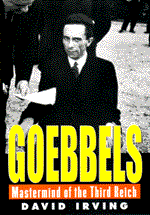|
Alex G. asks on Wednesday, May 20, 2009 an important question about Rudolf Hess's brave attempt to stop the war in 1941 Photo shows: Rudolf Hess by Heinrich Hoffmann. From John Horne/David Irving collection.
What did Hitler know about the 1941 Rudolf Hess mission to Britain?
I AM an 18 year old college
student and I wanted to tell you how much I have
enjoyed reading your writings. I have heard a lot
about you and your works in the I am very grateful that you allow your extraordinary works to be accessed free of charge on your website and I thoroughly enjoyed your dissection of the mind of Rudolf Hess, along with your balanced account of one of the most interesting events of World War II. I found the way you expertly weaved diary entries, political writings, and police reports into your narrative very reminiscent of William Shirer's The Rise and Fall of the Third Reich, although I found your assessment of World War II and Nazi Germany more even handed than Shirer's sometimes inflammatory commentary.
I did have a question on your book about Rudolf Hess, which I hope you have the time to address. Your book often refers to Hess as a "blind follower" of Adolf Hitler, yet the defining mark of his life was his flight to Britain, which was certainly not done with the approval of Hitler. I was wondering if you see a contradiction in describing Hess as a follower, when he displayed such conviction and resolute determination in his efforts to work for peace without the consent of Hitler. It would be interesting to hear your personal feedback on this point, but I certainly understand if your too busy to reply. I must admit, I do feel rather guilty downloading your books on line without paying for them, so I wanted to pledge to you that I would donate a portion of my summer job's wages to the upkeep of your website as a token of my respect for you and your work. Thank you for your commitment to historical accuracy and I hope this message reaches you in good health and spirits. With much sincerity, Alex
G.,

David Irving replies: THAT is a very kind letter. Most encouraging for us folks who have spent a lifetime doing the research and writing. I recall fondly my two visits to the Citadel in Charleston, where they had military records I studied for the Rommel biography. I think that Hitler half-knew about Hess's intentions to fly to Britain; in August 1940, as you know from my book, he certainly instructed Hess to contact his aristocratic friends over here and persuade them he had no intention of attacking us. Churchill "intercepted" Hess, and that was that. Shirer's book was incidentally very good for its time. He had no access to government files or the masses of documents that have since become available, and relied heavily on the Nuremberg files, which were of course largely prosecution records. Even so, he did a very commendable job. For an even better account of the period, I recommend you obtain a copy of Chester Wilmot's The Struggle for Europe, a convincing, very well documented, and gripping account of the war years. | ||||||||||



